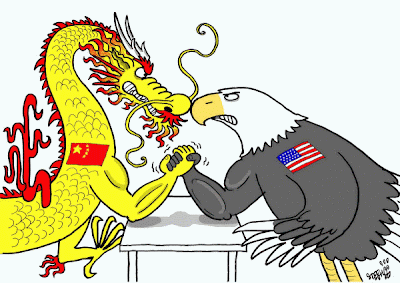"Thus the enemy is established by deceit, moves for advantage, and changes through segmenting and reuniting"
---Sun Tzu
In recent months, the leadership of the People's Republic of China has quietly attempted to test the limits of the Obama Administration in terms of how far it is willing to go in aiding President Xi Jinping's vision of a "New Type of Great Power Relationship". While dialogue between global heavyweights such as China and the United States can beneficial if a mutual respect is given, actions speak louder than words. Thus far in this modern chapter of the relationship, China has taken a pattern of increasing its military assertiveness in the East-Southeast Asian region as its military capabilities have modernized and expanded--thus challenging the long established status-quo of stability and economic prosperity in the region, largely a result of the established (and for the most part welcomed) U.S. military presence in the region. China has also used its rapid economic rise to pressure countries, including to a great extent the United States, to various economic and geo-political concessions that gives China a unique advantage when pursuing its strategic objectives.
Some within the halls of Capitol Hill and academia subscribe to the notion that by embracing China now will result in a future China that can be "molded and crafted" into a benevolent state that adheres to Western values and democracy in the future. While the future cannot be judged, the present actions of the PRC can. China has been of little or no help to American interests in either Asian or global affairs, or in the areas of a fair economic relationship between the two states. There has been no help by the PRC in the American interests of stopping Iran's or North Korea's nuclear programs. In fact, it is widely accepted that the PRC has sold substantial quantities of arms to both countries. China has also threatened to disrupt the stability of the East Asian region, with claims of territorial sovereignty of the Japanese controlled Senkaku Islands, as well as the Philippine-administered Mischief Reef. The idea of the Western perception of human rights penetrating the PRC has also been an abject failure. The PRC continues to rule the Xinjiang and Tibet Autonomous Regions with an iron fist: Destroying thousand-year old towns, forced relocation of families, and even monetary bonuses given to newly-married couples who are of the Han-minority mixed race status. As King Edward "the Longshanks" stated in the movie Braveheart, "If we can't get them out, we'll breed them out."
 |
| Warning sign placed by CCP government in Tibet |
Now China wants more.
According to multiple reports, China feels assertive enough under its new leadership, led by President Xi Jinping, to make some rather bold requests to the U.S. regarding current trade restrictions that are currently in place. Among the alleged requests:
---The lifting of all sanctions imposed by Congress after the 1989 Tiananmen Square Massacre
---The removal of limits of commercial satellite cooperation and exports, unfettered access of integrated circuit technology, and greater access to U.S. aerospace and electronics technology.
--Requests that the State Department's arms export control list, be downgraded and administered by the trade-oriented Commerce Department. This change would allow the export of sensitive defense technology to China.
The last request is perhaps the most troubling. The PRC has long had a standing policy of non-interference of other countries internal affairs. Beijing often points to this policy when asked about it's lack of action taken towards well-documented human right abuses in areas such as the Sudan and Syria. Yet, Chinese leadership feels confident enough to breach this protocol and "request" that the United States make major changes in its federal government's weapons-proliferation regulation system.
There's more
Beijing has also asked the Obama administration to allow for China's Commercial Aircraft Corporation of China (COMAC) to be named a "validated end-user", which would permit easier exports of sensitive defense-related aircraft technology. This controversy has previously arisen within the halls of Congress, as in 2011 Congressman Randy Forbes (R-VA) stated the concerns of many within the U.S. lawmaking body about the joint venture between the American company General Electric and Chinese state owned aircraft company AVIC, in which the technology that was being used to help AVIC develop avionics for its aspiring domestically produced jumbo airliner could easily be converted for military use. If restrictions were lifted, such future joint ventures would be less likely to come under the jurisdiction of Congress, and therefore be permitted unfettered. It is not a secret that most (if not all) major Chinese corporations have a strong but often silent hands in the form of Communist Party officials who have access to the latest technological advancements that these companies acquire and produce. Increased access to American companies will allow for such officials to gain easier access to sensitive technology that the People's Liberation Army so greatly covets.
 |
| Will this........................... |
 |
| Lead to this? |
It is not yet known which, if any of the demands made by the PRC will be accepted by the current administration. One hopes, however, that with the current threat of a government shutdown and debt ceiling issues taking most of the attention and headlines out of Washington, that the PRC requests will set off alarm bells before such an arrangement can be quietly agreed upon.

Roos
ReplyDeletepoos
Delete